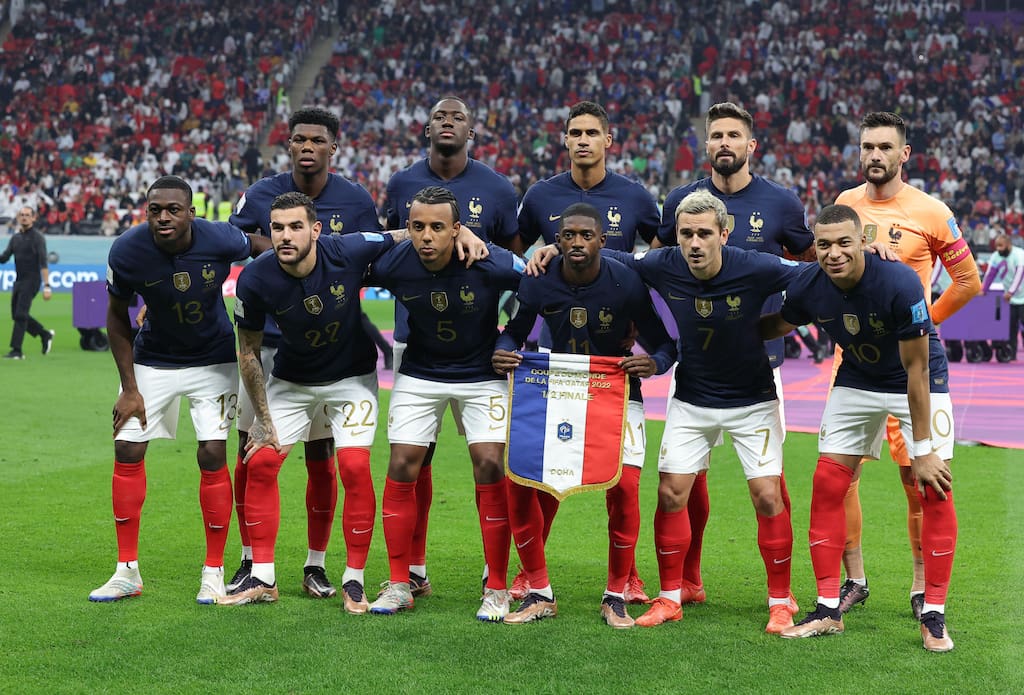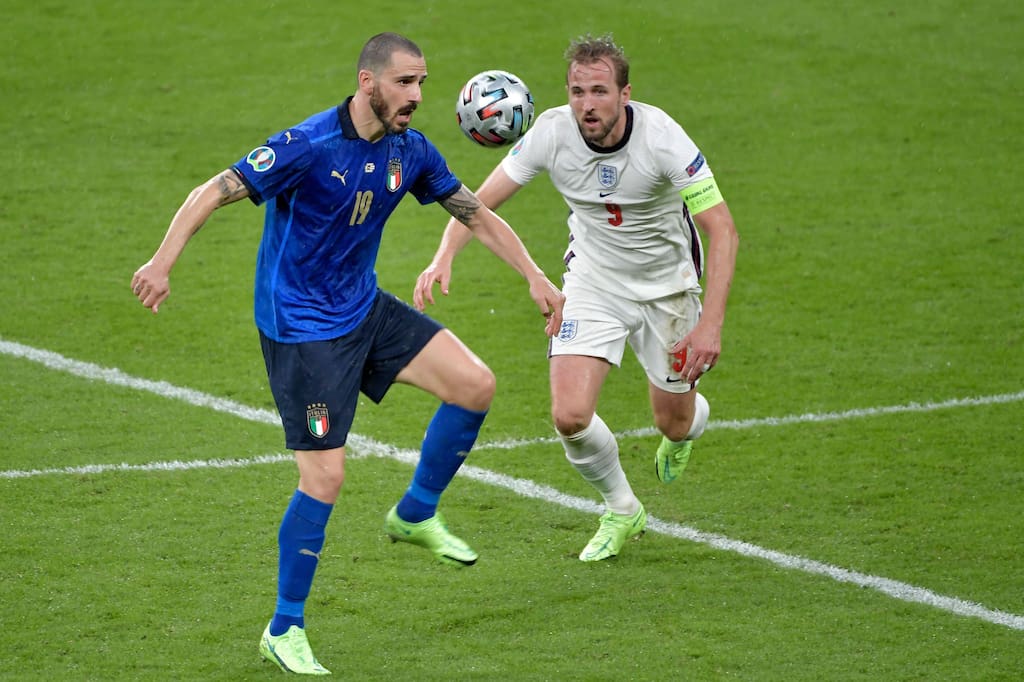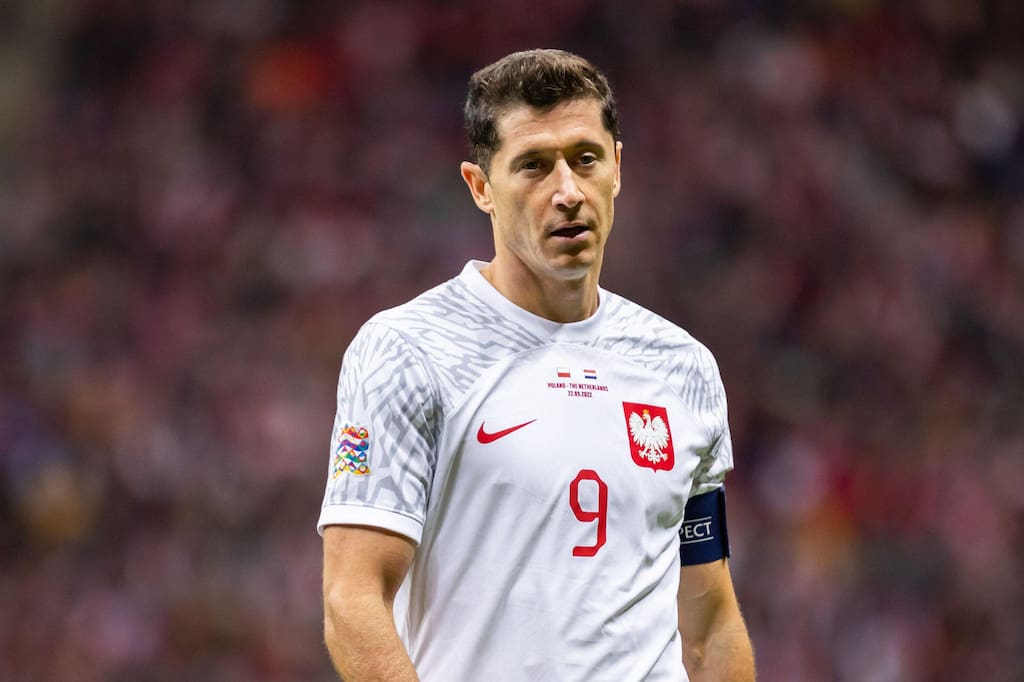Euro 2024 qualifying kicks off on Thursday. 53 nations will be competing for 23 spots at next summer’s European Championship finals.
It’s worth noting that Germany have already qualified as hosts, while Russia remained suspended from competing in all FIFA and UEFA competitions.
The top two in each group will qualify for the Euros. That part is simple!
The remaining three spots will be up for grabs in the play-offs, taking place in March 2024; the play-off places will be distributed based on a team’s UEFA Nations League ranking. Not so simple… we’ll cross that bridge when we get to it.
This articles goes through each group, predicting who will qualify.
📰 Table Of Contents
- 1 Group A: Spain, Scotland, Norway, Georgia & Cyprus
- 2 Group B: France, Netherlands, Republic of Ireland, Greece & Gibraltar
- 3 Group C: Italy, England, Ukraine, North Macedonia & Malta
- 4 Group D: Croatia, Wales, Armenia, Türkiye & Latvia
- 5 Group E: Poland, Czechia, Albania, Faroe Islands & Moldova
- 6 Group F: Belgium, Austria, Sweden, Azerbaijan & Estonia
- 7 Group G: Hungary, Serbia, Montenegro, Bulgaria & Lithuania
- 8 Group H: Denmark, Finland, Slovenia, Kazakhstan, Northern Ireland & San Marino
- 9 Group I: Switzerland, Israel, Romania, Kosovo, Belarus & Andorra
- 10 Group J: Portugal, Bosnia & Herzegovina, Iceland, Luxembourg, Slovakia & Liechtenstein
- 11 Predicting the play-offs
Group A: Spain, Scotland, Norway, Georgia & Cyprus

(Alamy Stock Photo)
Three-times winners Spain have qualified for every edition of the Euros since 1992, with this streak very much set to continue.
In the context of this group, it’s the fight for second spot that’s substantially more interesting.
Norway haven’t qualified for any major tournament since 2000, beaten by Serbia in the Euro play-offs three years ago.
However, with Martin Ødegaard and Erling Braut Håland in their ranks, Ståle Solbakken’s side are a force to be feared.
The Manchester City striker has scored 21 goals in 23 senior caps, on top of the 42 club goals he’s already bagged this season.
So, this is a nightmare draw for Scotland, who ended their own 23-year wait for a major tournament appearance at the most-recent Euros.
Last year, Steve Clarke’s side secured promotion to the top-tier of the Nations League, thanks to memorable home wins over Ukraine and Republic of Ireland.
However, the Tartan Army haven’t finished in the top two of a qualifying group for 20 years, and will do well to change that here.
A word for Georgia who, despite being obvious outsiders, will be no push-overs.
Willy Sagnol’s side are unbeaten in eight competitive games, winning seven of them, securing promotion to Nations League B in this period.
The Crusaders have lost just nine of their last 26 competitive home fixtures and, with Khvicha Kvaratskhelia in their ranks, are capable of an upset or two.
Poor Cyprus could well end up pointless.
Predicting who will qualify: 1st: Spain. 2nd: Norway.
Group B: France, Netherlands, Republic of Ireland, Greece & Gibraltar

(Alamy Stock Photo)
Group B has a very obvious top two doesn’t it?
When last we saw them, France were appearing in a second consecutive World Cup Final, beaten on penalties by Argentina in Qatar.
Since then, four stalwarts have retired, but Head Coach Didier Deschamps has signed up for four more years in charge.
Les Bleus have qualified for each of the last eight European Championships and that sequence will not be broken in 2023.
France kick off this latest campaign with a heavyweight Friday night clash against the Netherlands in Paris.
This’ll be Ronald Koeman’s first match in charge, of his second stint, having succeeded Louis van Gaal following the World Cup.
Koeman guided Oranje to the inaugural Nations League Final in 2019, claiming a notable win over France en route.
Now, having failed to qualify for 2016 and 2018, the Dutch will be hoping to cruise through this campaign, with the Nations League Finals, on home soil, to look forward to in the summer.
Given the likely dominance of the top two, Republic of Ireland and Greece will simply be targeting strong performances, looking ahead to the play-offs next March.
For the Greeks, they’ve failed to qualify for four consecutive major tournaments, despite appearing at four out of five beforehand.
However, under Gus Poyet, they’re on their way back, finally securing promotion out of Nations League C last year, winning five of six games.
Republic of Ireland meanwhile appeared at both Euro 2012 and 2016, before being dumped out by Slovakia on penalties in the Euro 2020 play-offs.
Stephen Kenny’s side certainly lacks talent, but there are signs of improvement, specifically coming when smashing Scotland 3-0 in Dublin last summer.
In short, the two heavyweights will qualify from this group, but don’t be surprised if Ireland or Greece spring a surprise or two.
Gibraltar have lost all 38 European Qualifiers they’ve ever played, conceding 177 goals, with both figures set to rise.
Predicting who will qualify: 1st: France. 2nd. Netherlands.
Group C: Italy, England, Ukraine, North Macedonia & Malta

This group will kick off on Thursday with a rerun of the most-recent European Championship Final.
Just 620 days ago, Italy beat England on penalties at Wembley, thereby lifting their first Euros for 53 years.
Since, Gli Azzurri have failed to qualify for a second successive World Cup, embarrassingly beaten by North Macedonia in the play-off semi-finals 12 months ago.
Despite that, they’ve shown faith in Roberto Mancini, and he’s guided Italy to this summer’s Nations League Finals.
To get there, Italy went unbeaten against England last year, drawing 0-0 at Molineux before a 1-0 victory at San San Siro last September.
This means Gli Azzurri are now unbeaten in nine competitive meetings with England, a streak they’ll be seeking to extend at Stadio Diego Armando Maradona on Thursday.
As for the Three Lions, they were last in action in Qatar, ousted by France in the World Cup quarter-finals.
Since then, Gareth Southgate has decided to stay on as manager, dreaming of finally ending 58 years of hurt next year in Germany.
On paper, these two former winners look set to take the top two spots, but do not write off Ukraine.
Ruslan Rotan’s side are, arguably, the strongest team that could’ve come out of pot 3, seeking to qualify for a third successive European Championship.
However, unless they manage to spring a massive surprise, the Blue and Yellows will be looking towards next March’s play-offs.
North Macedonia also cannot be taken lightly, making their tournament debut at Euro 2020, before enjoying away wins in Germany and Italy during World Cup qualification.
Given the strength of the other four sides, Malta could end a campaign with zero points for the first time since 1999.
Predicting who will qualify: 1st: England. 2nd. Italy.
Group D: Croatia, Wales, Armenia, Türkiye & Latvia

(Alamy Stock Photo)
Three nations in Group D have been Euros regulars in recent years, but at least one will miss out on automatic qualification.
Croatia are the obvious favourites to take top spot, having knocked out Japan and Brazil en route to another World Cup semi-final back in December.
Before that, Zlatko Dalić’s side qualified for the Nations League Finals, so are just two wins away from the country’s first-ever major silverware.
Having qualified for 12 of 14 major tournaments since independence from Yugoslavia, the Blazers will expect to come through this campaign with relative ease.
Wales too have reached the knockout stages at the last two Euros, before appearing at their first World Cup for 64 years in November.
However, with talisman Gareth Bale having retired, Rob Page’s team could be set for a transition period.
So, can Türkiye sneak into second spot, despite actually being the fourth-seeds?
Stefan Kuntz’s side will be full of confidence, having won promotion back to Nations League B last June, winning all four matches last June, scoring 14 goals and conceding none.
The Crescent-Stars are guaranteed a play-off spot, but will be hoping not to need it, as they aim to qualify for a sixth Euros since debuting in 1996.
Armenia are the only team in this group who’ve never qualified for a major tournament and, having lost their last five in a row, Oleksandr Petrakov has been appointed to arrest the slide.
Latvia did feature at Euro 2004, but have massively declined since, so are likely to finish rock bottom.
Wales will face Türkiye in Cardiff on the final matchday, and that game could prove to be a straight shootout for qualification.
Predicting who will qualify: 1st: Croatia. 2nd. Türkiye.
Group E: Poland, Czechia, Albania, Faroe Islands & Moldova

(Alamy Stock Photo)
To summarise, this group features two quite good teams and three not so good teams.
Poland have been qualifying experts in recent years, featuring at the 2018 and 2022 World Cups as well as four successive European Championships.
Once at those tournaments, the Eagles tend to disappoint, although they did reach the World Cup knockout phase for the first time since 1986 back in November.
Nevertheless, under new boss Fernando Santos, who led Portugal to Euro 2016 glory, Poland are set to take top spot in Group E.
Czechia too should be far too strong for the other three teams in this section.
Jaroslav Šilhavý guided his nation to the quarter-finals of Euro 2020, with Czech Republic having qualified for all seven Euros since they gained independence.
If anyone is going to challenge the obvious top two, it’s most-likely going to be Albania, but even that seems like a long-shot.
The Red and Blacks made their major tournament debut in 2016, but come into this campaign having won just one of their last seven competitive fixtures, this a 1-0 home win over Andorra.
In comparison to other minnows, Faroe Islands are an improving force, so they should pip Moldova to fourth.
Predicting who will qualify: 1st: Poland. 2nd. Czechia.
Group F: Belgium, Austria, Sweden, Azerbaijan & Estonia

(Alamy Stock Photo)
The Domenico Tedesco era begins, with the Red Devils confident of qualifying for a third successive Euros for the first time ever.
Back in November, Belgium crashed out in the World Cup group phase, which represented a rather disappointing end to the golden generation’s ultimately unsuccessful pursuit of silverware.
De Rode Duivels may not be serious trophy contenders going forward, but should have more than enough quality to negotiate this group.
Just below them, Sweden and Austria will go head-to-head for second spot, a tussle that could go either-way.
2022 did not go to plan for Janne Andersson’s side, with Sweden beaten in the World Cup play-off final by Poland, before being ignominiously relegated to Nations League C.
However, the Blågult have qualified for all six Euros this century, one of just six countries to achieve this, so are hopeful of maintaining that record.
Austria will stand in their way, with Das Team seeking to appear at a third consecutive Euros.
Ralf Rangnick’s side come into this campaign winless in five, suffering relegation to Nations League B in September.
There’s very little to separate these two, so their clashes in Vienna on 20 June and Solna on 12 September will be key.
Azerbaijan and Estonia will be looking to their own head-to-head encounters for points.
Predicting who will qualify: 1st: Belgium. 2nd. Sweden.
Group G: Hungary, Serbia, Montenegro, Bulgaria & Lithuania

(Alamy Stock Photo)
Similar to Group E, this group features two capable teams and three pretty poor outfits, suggesting there will be a clear divide between second and third.
Oddly, despite qualifying for three of the last four World Cups, Serbia have never featured at a European Championships as an independent nation.
Dragan Stojković’s teams beat Portugal en route to Qatar 2022, before amassing a measly one point at the tournament itself.
In 2021, the Eagles were beaten by Scotland on penalties in the play-off final, but should end their wait for a Euros debut far more comfortably this time round.
Hungary meantime have featured at back-to-back Euros, despite not qualifying for any tournament for 30 years beforehand.
Marco Rossi’s side were very impressive in Nations League A last year, finishing second in their group, notably beating England twice and then Germany in Leipzig.
So, none of the other three teams are likely to challenge the top two seeds.
Bulgaria’s wait for a first tournament since Euro 2004 is set to go on, given that the Lions have won just six of their last 32 competitive games.
They and Montenegro are both much better than Lithuania, but it would be a huge shock if it wasn’t Serbia and Hungary who qualified.
Predicting who will qualify: 1st: Serbia. 2nd. Hungary.
Group H: Denmark, Finland, Slovenia, Kazakhstan, Northern Ireland & San Marino

(Alamy Stock Photo)
Denmark are the clear favourites to take first place in Group H, but the fight for second could be fascinating.
De Rød-Hvide reached the semi-finals of Euro 2020, but exited the World Cup with a whimper, scoring just one goal and failing to win a game.
Nevertheless, the DBU have shown faith in Kasper Hjulmand and, given that Denmark have lost just one of their last 27 qualifiers, top spot should be theirs.
Below them, everyone bar San Marino will believe second is up for grabs.
Finland are the second seeds, after making their major tournament debut in 2021.
However, since the start of 2021, Markku Kanerva’s team have won only six of 17 competitive fixtures, so are far from guaranteed to take second place.
Slovenia could be the favourites to pinch that place, hoping to reach just a second Euros, 24 years after their debut.
Matjaž Kek’s team were decent last year and, with both Jan Oblak and Benjamin Šeško in their ranks, will do some damage.
Northern Ireland meanwhile have reappointed Michael O’Neill as manager; he led them to the Euro 2016 knockout phase and the World Cup 2018 play-offs.
The Green and White Army have only won three of their lat 25 competitive outings but, in a wide-open group, will believe their luck is about to change.
Kazakhstan will also be full of confident, having secured promotion to Nations League B back in September.
The Hawks have only ever won ten of 94 UEFA qualifiers but are an emerging force, particularly on their own artificial turf.
Lastly, San Marino have never won a competitive game in 166 attempts, losing 161 of them, conceding 724 goals; it would be a miracle if la Serenissima got any points at all.
Predicting who will qualify: 1st: Denmark. 2nd. Slovenia.
Group I: Switzerland, Israel, Romania, Kosovo, Belarus & Andorra

(Alamy Stock Photo)
Of UEFA’s 55 members, 36 have qualified for a major tournament, with Israel the most-likely side to add their name to that list.
The Blue and Whites featured at the 1970 World Cup as an Asian representative but, since shifting over to Europe in 1992, have never successfully negotiated a campaign.
However, last year, Alon Hazan’s side achieved promotion to the top-tier of the Nations League, so will come into this campaign full of belief.
Israel’s most-likely rivals for a top two finish are Romania, seeking to reach a sixth European Championships.
Edward Iordănescu’s side were relegated to Nations League C in September, but were strong in World Cup qualifying, missing out on the play-offs by a solitary point.
Israel and Romania’s meetings, in București on 9 September and in Jerusalem on 18 November, will be critical.
That’s because Switzerland are likely to cruise to first place.
Murat Yakın’s team reached the World Cup knockout phase in December, with the Swiss featuring at nine of the last ten major tournaments.
Kosovo will probably comfortably finish fourth, with Belarus and Andorra battling to avoid the wooden spoon.
Predicting who will qualify: 1st: Switzerland. 2nd. Israel.
Group J: Portugal, Bosnia & Herzegovina, Iceland, Luxembourg, Slovakia & Liechtenstein

(Alamy Stock Photo)
Outside of Portugal, this group seriously lacks quality, meaning the fight for second is wide-open.
The top seeds begin life under Roberto Martínez, after Fernando Santos’ eight-year reign came to an end, following their World Cup exit to Morocco.
A Seleção have qualified for every Euros since 1992, with this streak set to continue with some ease.
Assuming Cristiano Ronaldo, who has been called up, gets on the field, he’ll certainly add to his 118 international goal, particularly on matchday one with Liechtenstein visiting Lisbon.
With Portugal and Liechtenstein set to finish top and bottom respectively, the other four teams will all believe second is within their grasp.
Bosnia & Herzegovina are desperate to make their Euros debut, having fallen in the play-offs for the previous three editions.
The Dragons were promoted back to Nations League A in September, making Faruk Hadžibegić’s team favourites to qualify.
Slovakia meanwhile have appeared at back-to-back Euros, but defeats to Kazakhstan and Azerbaijan last year emphasise they they’re not as strong as they once were.
Iceland meanwhile featured at Euro 2016 and Russia 2018, before only missing out on Euro 2020 in the play-offs.
Arnar Viðarsson’s side have won just two of their last 19 competitive games, both against Liechtenstein, so will need to turn that form around, and quickly.
Lastly, Luxembourg are on the rise, dreaming of a first-ever major tournament in, what will be, their 37th qualification campaign.
The matchday ten match-up between Bosnia and Slovakia could be decisive.
Predicting who will qualify: 1st: Portugal. 2nd. Bosnia & Herzegovina.
Predicting the play-offs
If the above predictions are all correct which, granted, is the big if, the play-offs would look something like this:
Path A semi-finals*: Wales vs Montenegro. Ukraine vs Iceland.
Path B semi-finals*: Scotland vs Albania. Finland vs Republic of Ireland.
Path C semi-finals: Georgia vs Luxembourg. Greece vs Kazakhstan.
*Path A & B semi-finals would be determined by a draw. Path C is solely based on UEFA Nations League ranking.
If these were the semi-final match-ups, we’re predicting that Ukraine, Scotland and Greece would qualify, thereby completing the 24-team line-up.











